Miguel Coyula on Wikipedia and on Translating Cuba.
Video is subtitled and is 12 minutes long
23 February 2015
English Translations of Cubans Writing From the Island
Miguel Coyula on Wikipedia and on Translating Cuba.
Video is subtitled and is 12 minutes long
23 February 2015
Ivan Garcia, 20 February 2015 — Fifty Cuban and foreign journalists attended the press conference that a delegation of congressional Democrats headed by Nancy Pelosi held on the afternoon of Thursday, February 19 outside the residence of Lynn Roche, the U.S. Interest Section’s public affairs officer.
Nancy Pelosi, born in Maryland in 1940, traveled to Havana with representatives Eliot Engel, Nydia Velazquez and Steve Israel (New York), David Ciciline (Rhode Island), Rosa DeLauro (Connecticut), Collin Peterson (Minnesota), Anna Eshoo (California ) and Jim McGovern (Massachusetts). Pelosi and members of her delegation support removing Cuba from the list of state sponsors of terrorism and permanently lifting the U.S. embargo.
Other issues of mutual interest discussed at the conference included increased access to telecommunications, empowering small businesses, agricultural development and human rights. continue reading
Jim McGoven believes reconciliation between the two governments is the best way to reach an agreement on human rights. “I think that we can probably accomplish a lot more if we have a relationship based on mutual respect,” said McGovern.
Pelosi agreed with her colleague, adding, “Both countries need to rebuild mutual trust.”
During their three-day visit to Havana, the U.S. delegation stayed at the centrally located Hotel Saratoga and held meetings with chancellor Bruno Rodriguez, National Assembly president Ana Maria Machado and about twenty deputies, Cardinal Jaime Ortega, a group small private-sector business owners and Josefina Vida, Cuba’s lead negotiator in talks with the United States.
As of this writing, neither Nancy Pelosi nor any members of her delegation have met with Cuban dissidents. The new political landscape has divided the opposition. Activists such as Elizardo Sanchez and Jose Daniel Ferrer approve of the approach taken by President Obama. On the other hand, dissidents such as Antonio Rodiles and Berto Soler disagree with the White House policy.
The exchange with congressional Democrats was attended foreign correspondents as well as official and independent Cuban journalists. It was the third time that representatives of state and independent media outlets met at a press conference since December 17, when a historic diplomatic development was announced between two governments whose differences seemed irreconcilable.
The visit led by House Minority Leader Nancy Pelosi took place a week before officials from Cuba and the United States begin a second round of negotiations on Friday, February 27 in Washington. The first round took place in Havana in January.
Meanwhile, average Cubans have lowered any expectations they may have had over the improvement in relations between the two countries. To Yosuan, a Havana taxi driver, “it all sounds very nice but it’s unrelated to the needs of people on the street.”
Ivan Garcia and Celeste Matos reporting from Havana.
Photo: Marti Noticias.
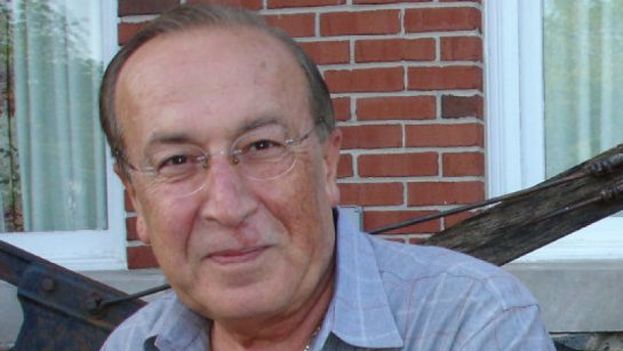
![]() The Canadian entrepreneur Cy Tokmakjian was released from prison in Cuba and is now back in Canada, his lawyer Barry Papazian informed the Canadian media on Saturday. The businessman was imprisoned in Cuba for more than three years and was sentenced to 15 years in prison for various crimes, including bribery and corruption.
The Canadian entrepreneur Cy Tokmakjian was released from prison in Cuba and is now back in Canada, his lawyer Barry Papazian informed the Canadian media on Saturday. The businessman was imprisoned in Cuba for more than three years and was sentenced to 15 years in prison for various crimes, including bribery and corruption.
The digital site Martinoticias also echoed the information and statements by Papazian, in which he says that, “Cy returns home in good health, fantastic sprits, and is looking forward to spending time with his family which includes three loving children and seven excited grandchildren.” The lawyer asked that that the privacy of his employer and his relatives be respected.
Tokmakjian operated business in Cuba for more than two decades, with a value estimated to have reached 80 billion dollars continue reading
In 2011 Tokmakjian was arrested and was made to wait two and a half years in prison, before charges against him were formally filed. In September 2014 he was sentenced to 15 years in prison for bribery and other economic crimes. Tried in the same case were fourteen Cuban officials as well as two senior executives of the Canadian company, Claudio Vetere and Marco Puche, who were sentenced to 12 and eight years’ imprisonment respectively on charges of fraud, bribery, currency trafficking, counterfeiting bank documents and tax evasion.
The release of Tokmakjian occurs a few months after the new Law on Foreign Investment in Cuba went into effect; through this law the government hopes to attract capital to various sectors of the national economy.
Angel Santiesteban, 7 January 2015 — To know that there is a Cuban who knew how to work against the dictatorship makes it easier to bear that the regime’s five spies are now back on Cuban soil. I rejoiced when it was revealed that this Cuban — responding not to the North American government but against the dictatorship of the Castros — was the cause, having passed information to United States intelligence agencies about the enemy network that was operating in its territory. He is a free man today, having been exchanged for the last three of those spies who were still in prison in the US].
In turn, the fact that Alan Gross is now back with his family also means relief for those of us who harbor good feelings — especially those of us who know firsthand the suffering continue reading
I believe the Castros will win any arm wrestling match in which their arms are supported by feelings. They do not care about keeping innocent people in jail, at least for the crimes with which they are charged. In the Gross case, the regime’s own reports affirm that this is about “a North American subcontractor who intended to smuggle into Cuba equipment which is not authorized by the government of the Island.”
If his crime is one of “smuggling,” then of what espionage is he accused? The government’s legal action was forced in the exchange for its spies, as has recently occurred.
There are good reason that it has an espionage and repression machine, lubricated by the oil of experience over more than half a century. The most important thing, to my understanding, is that the Communists in power have, for the moment, been left without a carrot to mobilize social media.
Throughout their more than 50 years in power, the Castros have been characterized by public “yearnings” — which they use to keep the Cuban people distracted. Nobody can forget the months of intense, manipulative propaganda regarding the return of the boy Elián Gonzalez, later replaced with an even more intense campaign for the return of the spies.
I suppose that at this moment, the ideologues of the regime must be finding themselves in a forced march in search of a new carrot to dangle, as well as a new objective to achieve. In the meantime, they will find entertainment in the embargo, which they like to call a “blockade” in order to produce maximum solidarity effect.
Starting with Obama’s announcement of establishing diplomatic relations with Cuba, an interesting chapter is opening that could end up, for the regime, being even more destructive than the embargo.
Ángel Santiesteban-Prats
December, 2014. Border Patrol Prison Unit, Jaimanitas, Havana.
Translated by: Alicia Barraqué Ellison
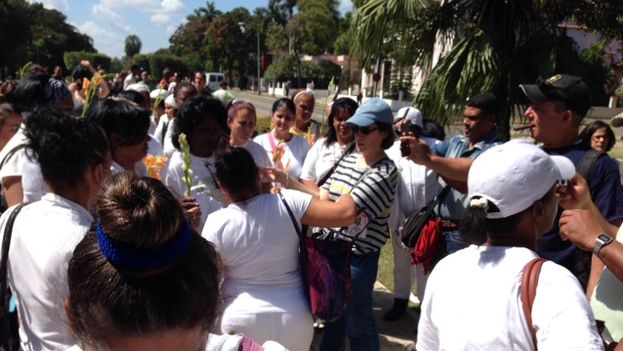
![]() 14ymedio, Havana, 22 February 2015 — During a press conference this afternoon, Berta Soler, leader of the Ladies in White, announced that a recall referendum would be held within the organization to define her continuity at the head of this Human Rights movement.
14ymedio, Havana, 22 February 2015 — During a press conference this afternoon, Berta Soler, leader of the Ladies in White, announced that a recall referendum would be held within the organization to define her continuity at the head of this Human Rights movement.
Surrounded fifty Ladies in White, Soler read a statement to several foreign correspondents and independent media gathered near the Church of Santa Rita, in the Havana neighborhood of Miramar.
According to the activist, she will submit her leadership at the head of the organization to a recall referendum. The date of the consultation will be this coming March 16, but she did not detail how the procedure would be carried out.
In her statement, Berta Soler also invited the Ladies in White living in Miami who signed a letter last week asking for her resignation to “return to Cuba to fight.” continue reading
In a letter published last Wednesday by the newspaper El Nuevo Herald, several founders of the Ladies in White in exile felt that the group needed a new direction and requested the resignation of Soler. According to the newspaper, 16 members of the organization in the United States defended Alejandrina Garcia de la Riva, another member of the group in disagreement with Soler.
At the conclusion of the press conference on Sunday, the Ladies in White cheered Berta Soler and chanted her name.
Soler explained that today’s march was dedicated to Orlando Zapata Tamayo, an activist who died in February 2010 after a prolonged hunger strike. The leader of the Ladies in White also said that once the press conference ended, the women would continue their pilgrimage beyond Avenida Quintera towards the neighborhood of Vedado.
This newspaper was able to confirm that minutes after crossing the Calle Linea tunnel, an act of repudiation was carried out against the Ladies in White who, for fifteen minutes, were surrounded by people carrying posters with official slogans and screaming out against them. The women were then forced into several buses waiting near the site and driven off to a unknown destination.
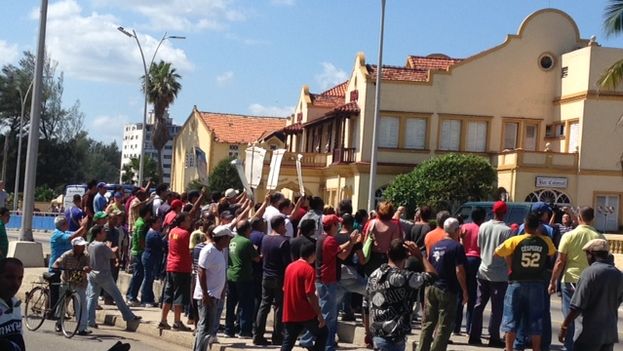
Ivan Garcia, 18 February 2015 — Fidel Castro appeared. The bearded old man spoke in an elliptical address that sowed fear of future relations between the two Cold War enemies.
The message was meant to cool the enthusiasm of the young. The old guerrilla, bellicose as ever, gummed up the works and dampened the festive atmosphere of a large segment of the island’s population who want to see an end to the longstanding dispute between Cuba and the United States.
You need not be a code breaker to decipher the meaning. It was a storm warning: The Yankees are still at the gate, only now with different weapons.
The hackneyed theory of ripe fruit. The gringos want to clog us with McDonald’s, broadband internet and smartphones. This time the Trojan horse is not a missile; it’s a computer. continue reading
Then it’s back to the trenches. The “barbarians from the North” want to take your money, apply their technology and do business, but only with the state. Castro I is sounding the alarm.
We do not yet know — perhaps we will in the future — if this was a concerted media offensive or if the old comandante is acting on his own. What we do know is that his brother Raul put on his boxing gloves at a summit in Costa Rica and made an offer.
The demands could have filled a basket. Some were unrealistic and over-the-top. Castro II was probably bluffing but it was an audacious move. The trick was knowing how far to test the limits of President Obama’s patience.
White House eagerness to arrive in April at Summit of the Americas in Panama with negotiations well underway, embassies reopened and an ongoing dialogue taking the burden of Cuba off its relationship with the rest of the continent is the Castro brothers’ secret weapon.
The playing field is uncertain. Venezuela is taking on water and Cuba’s finances are in the red. But in its favor the military regime has managed to maintain social and political control over an anesthetized nation.
However, they are stretched to the limit. In spite of being octogenarian, the Castros have more time to spare than Obama. Almost two months after the surprising diplomatic turn of events on December 17, Cuban authorities have decided to dampen the enthusiasm of Afro-Cubans.
The party propaganda machine is working at full speed. Editorials in government-run newspapers tell us the enemy is still out there. Negotiating with the Castros is an exercise in pure abstraction. They are always playing with marked cards. Or with nothing. But this time they have slipped up. Times have changed.
People are tired of all the mess, of the embargo, of a system that does not work, of the fear-mongering speeches. The narrative is no longer having its effect. When you ask eighteen- to thirty-year-old Cubans to where they would most like to emigrate, most say the United States.
The Castros’ policies have boomeranged. Never before in Cuba have so many people idolized the United States’ culture, consumerism and lifestyle as today.
It is a trivialized version of American society. Due to a lack of information — or simply because they suspect that the regime is lying — adolescents, young people and even many adults believe that in the United States dollars fall from the sky in parachutes.
Private sector workers think applying for a micro-credit loan from a New York bank is as easy as ordering a lemonade in Pinar del Rio or Cienfuegos. Since December 17 many Cubans have come to believe in political science fiction.
The Castro brothers have not outlined a strategy in which a street vendor or a private farmer can get a small loan from the United States.
Obama has also been blowing smoke. After eighteen months of secret negotiations and with information provided by the CIA, the White House should have foreseen that — as has always been the case — the Cuban regime would defend itself by going on the attack.
The philosophy of survival is a favorite for the brothers from Biran. From the perspective of the average Cuban, however, Obama is the winner. On the streets of Havana it is Fidel and Raul who are blamed for slowing down negotiations.
But the Castros are only interested in holding onto power and controlling every future diplomatic move. President Obama’s roadmap was merely a shovel for digging his own grave. They are no fools. They have pulled the emergency brake.
18 February 2015
Juan Juan Almeida, 18 February 2015 — The horse — like the language and guitar — were brought to Cuba from Spain and are today a part of the national culture. It is impossible to forget the role the animal has played in Cuban literature, music and the economy. And history discussions would be incomplete without some mention of Mambisa horsemanship.
The Cuban Revolution, however, marked a turning point in the development of equine culture. Shortly after 1959 Isidious (Fidel Castro’s white horse), Azbache (the same owner’s black horse) and other thoroughbreds which were beautiful regardless of color were shipped to the Managua breeding facility located next to a tank base of the same name on the outskirts of Havana. The rationale was that on their backs the animals bore the symbolic sweat of their owners’ buttocks and, therefore, had to be protected with the same vigilance as any national treasure. continue reading
But as we now know, these national treasures perished. Insidious died of a heart attack and Azabache (either because he was beautiful or because he was black) had his image stamped onto a photograph which, like a majordomo, greets generals and tourists at the entrance to the above-mentioned facility.
It was then that the historic, aesthetic and hysterical leader, saddened by the loss of his steed, authorized the importing of twelve different breeds of horses from which to select his Bucefalo, encourage the breeding of horses, export them overseas either as animals or semen, and crossbreed them with local stock.
As a result, horse breeding took off and today the country can boast of more than 300,000 thoroughbreds scattered among various farms. Most are managed by a state conglomerate, Flora and Fauna, under the direction of the Revolutionary commandant Guillermo García Frías. Some are raised on Cuban plantations such as El Alacazar — located in Contrammaestre, Santiago de Cuba — which is owned by Señora María Antonia Puyol Bravo (known as La Doña).
Horses are exported in a prescribed manner. From El Alcazar, come purebred Spanish horses. From Escaleras de Jaruco (in Mayabeque province), there are also Spanish thoroughbreds. From the Belen farm an American breed, Morgan, is exported. From Rancho San Vicente (20 kilometers south of the city of Camaguey) they are Arabian purebreds. From Guatiba (Matanzas province) there are Creole pintos. From Escambray come Appaloosas. And from Rancho Azucacero (Artemesia province) come jumping and show horses that have been imported from Holland since 2005. These are auctioned off at the Equestrian Club in Lenin Park’s riding school during the Remate Élite Habana, which takes place every year in the Cuban capital.
There is talk of a trail of tainted money behind the scenes at the auction, but no one has been able to prove it much less conduct an audit. Cuba’s problem is not corruption but the immunity of certain corrupt officials who — as one might expect — are so high up that they are beyond the judicial reach of the comptroller general.
Every January more and more foreigners attend this event, which this year attracted exiled Cuban businessmen, who were much more interested in showing off their lifestyles than indulging their newfound passion for horses.
Far be it from me to judge but I know that — as my grandmother used to say — “crises are moments of great opportunity” and these compatriots travelled to Cuba to defend, in their own way, the right of every Cuban to own his or her own horse.
18 February 2015
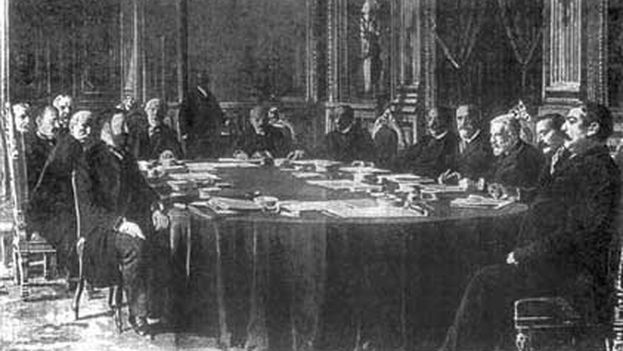
![]() 14ymedio, Ferrán Nuñez, Paris, 21 February 2015 — With the signing of the Treaty of Paris of 1898, Spain ceded or sold the last pieces of its former empire where, in the time of Carlos V, “the sun never set.” This treaty, as has already been proven by Pedro Albizu Campos, had several legal defects that made it invalid. Curiously, no Spanish politician has used these arguments to challenge it outright. This is due to two main factors: The first, ignorance, and the second, of equal weight, reality. Spain today, as it has been for the last 115 years, is not in any shape to oppose the “Pax Americana.”
14ymedio, Ferrán Nuñez, Paris, 21 February 2015 — With the signing of the Treaty of Paris of 1898, Spain ceded or sold the last pieces of its former empire where, in the time of Carlos V, “the sun never set.” This treaty, as has already been proven by Pedro Albizu Campos, had several legal defects that made it invalid. Curiously, no Spanish politician has used these arguments to challenge it outright. This is due to two main factors: The first, ignorance, and the second, of equal weight, reality. Spain today, as it has been for the last 115 years, is not in any shape to oppose the “Pax Americana.”
However, today this legal fissure acquires an unexpected dimension. Spain, through various laws, decrees and circulars, has decided to re-establish the rights of nationality for many of its former citizens who lost their nationality for different reasons in the last century (and even earlier, as is the case of the Sephardic Jews). Over time this worthwhile path is going to turn out partial and incomplete because unfathomable depths of injustice continue reading
The Treaty of Paris completely dispossessed Cubans and Puerto Ricans born overseas of their status as Spaniards, leaving them to the disposition of the new authorities as if it were dealing with material property of the Crown ceded or sold by virtue of that agreement. Something that was in frank contradiction of the rights of peoples and is one of the reasons that the said treaty was never ratified by The Cortes – the Spanish Parliament – until today.
Few rose then to denounce such injustice, carried to The Cortes by Admiral Cevera, among others. Later a royal decree was published in the Manual of Military and Civil Classes, which declared them foreigners. Nevertheless, according to the current Constitution, the Civil Registry of the Kingdom was the only agency authorized legally to recognize (once registration had proceeded) the loss of nationality of those Spaniards, and this never occurred.
By not duly settling in the Kingdom of Spain’s civil registry the new administrative status of the natives of the island of Cuba, they continued to maintain de facto Spanish nationality.
The creation of the Republic of Cuba did not resolve this legal problem either, given that the Cuban Constitution established that those people had to “opt” for the new Cuban nationality, something that in practice – and from all the evidence – also turned out difficult to put into practice. Those who did not do it, as well as their descendants, kept their de facto status as Spaniards at least until 1940. As a result, their descendants continue to be Spanish and could demand that status currently in Spain’s civil registries.
In 1940, the new Constitution decreed by ius solis (birthright through parentage) Cuban status to those born in Cuba so that Spaniards who did not “opt” at that moment to keep their Spanish nationality ended up losing it as did their descendants.
However, Spanish nationality does not depend on Cuban nationality or vice versa. Each sovereign state decides for itself who are its citizens. Spain cannot impugn the Treaty of Paris but it can do justice to the descendants of those Spaniards, recognizing their right to nationality. Nothing prevents it and it would be an act of basic justice. The recent decisions by the Supreme Court denying Spanish status to those born in overseas territories are a disgrace and a legal aberration. Given the current international political environment, offering nationality to all those descendants of Spaniards who seek it opens unusual prospects – transcendental – for the cause of Hispanic heritage. Only a blind man would not know how to see them.
Translated by MLK
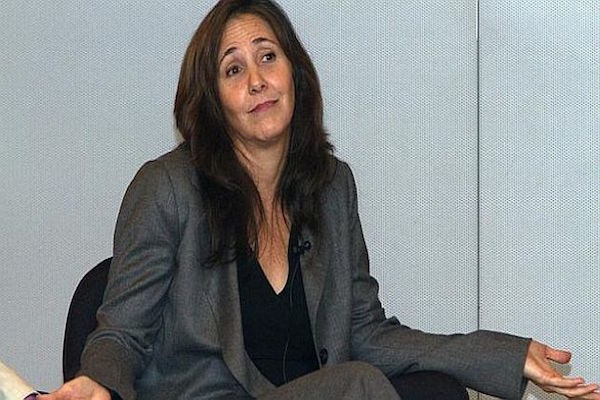
Cubanet, Tania Díaz Castro, Havana, February 19, 2015 — Homosexuality has been around longer than humans have been walking upright. But Fidel Casto — working through State Security, an organization he founded and of which he has always been in charge — has done everything possible to banish it from Cuban soil. He once looked upon it as a cancer capable of eating away his dictatorship.
In an August 2010 interview with the journalist Carmen Lira for the Mexican newspaper La Jornada, the Cuban leader for the first time confessed feeling guilty for the emergence of homophobia in Cuba, an attitude that is still prevalent in the country’s top leadership.
In the interview he acknowledged that “there were moments of great injustice” and noted that he personally had no such prejudices. On this particular occasion the Comandante was not lying. Several of his friends in positions of power were widely known to be homosexuals, including Alfredo Guevara and continue reading
The thousands who were identified by State Security suffered imprisonment, harsh treatment and were forced to do hard labor in the notorious Military Units to Aid Production (UMAP).
Half a century has passed. The Castro dictatorship is still in power. The same problems still exist, only to a lesser degree. It is perhaps for this reason that the current president’s daughter, Mariela Castro, spends her free time on a campaign of sorts against homophobia and discrimination in general.
It seems that she may have been inadvertently criticizing her uncle, Fidel Castro, when in an interview with the ANSA news agency she said, “There is no doubt that in their creation in 1965 and in their operations, the UMAPs were arbitrary.” Arbitrary is another term for unjust, despotic, abusive and tyrannical.
Mariela’s current silence is curious given what recently happened on the TV soap opera La Otra Esquina (The Other Corner), which can be seen on Cuban television’s Channel 6.
As is now public knowledge, this soap opera — written by Yamila Suarez — was apparently forced to conceal a storyline concerning the characters Oscar and Esteban, a gay couple played by two wonderful veteran actors.
Changes involving episodes being edited and brief blackouts occurring during the broadcast strongly suggest that, since the show could not be cancelled — its schedule had already been announced and there was no available replacement — it was censored on orders from the Central Committee of the Cuban Communist Party.
So what has the defender of gay rights done in response in the months since?
Nothing.
She has not said if she participated in the heated discussions at the Cuban Institute of Radio and Television (ICRT) in an attempt to fend off eliminating the love story between the elderly Oscar and Esteban in favor of more filial relationships that had nothing to do with the plotline
In last week’s episode a photo of the two lovers could be seen on a table. They were standing with their heads pressed together, a classic and tender expression of love. The censors forgot to remove from the set this and other props that revealed what was going on.
On February 9 the independent journalist Frank Correa denounced the action in an editorial published on CubaNet, thus bringing to public attention the difficulties La Otra Esquina had to go through to get on the air.
In this production Mariela exited stage left.
She was not looking to create more problems with her little old uncle.
The way the show has been changed is evidence that in Cuba homophobia is still with us.
20 February 2015
 Iván García, 2 February 2015 — It is half past noon and Saul is collecting bets for the clandestine Cuban lottery known as bolita (little ball) or charada, (charade) which was legal before 1959 and has always been very popular.
Iván García, 2 February 2015 — It is half past noon and Saul is collecting bets for the clandestine Cuban lottery known as bolita (little ball) or charada, (charade) which was legal before 1959 and has always been very popular.
Under a scorching sun that provides a tint of summer to what passes for winter on the island, he walks along the steep backstreets of La Víbora, a neighborhood south of Havana. At seventy-six he has found no better way of making money than as a bookie.
“It didn’t matter that I fought at the Bay of Pigs and Escambray. I retired with a monthly pension of 207 pesos (around eight dollars). I make twice that amount taking bets for the bolita every day,” he says as he records a wager by the manager of a farmers’ market in a school notebook.
Around noon he collects the bets of his best clients continue reading
“They are big players, from 150 to 500 pesos. And since I make two runs a day — one in the morning and one in the afternoon — some of them bet twice a day. I get ten percent of the take, which on a normal day is more that two-thousand pesos,” says Saul.
Although it is illegal, with convictions carrying sentences of two to five years in prison, the game has been played with increasing openness in cities and towns across the island since the 1980s.
In Cuba’s heartland, organized clandestine cock fights bring in a lot of money. In the capital there are a dozen such organized fight rings, each with three bouts a week.
Cock fighting has become an industry. There are people who buy and train aggressive roosters, veterinarians who care for the birds, the owners of rings and others.
Dog fights have also been increasing. It is a bloody and horrific spectacle that generates thousands of convertible pesos at every event.
Houses are routinely being converted into illegal gaming parlors known as burles. Another form of gambling involves car and motorcycle racing on the outskirts of Havana. Often the lookouts for these races are the police themselves.
But the oldest and most popular betting game is the bolita, a system that operates like a Swiss watch.
Modesto has been a bookie since the 1980s, when times were hard. “I was arrested a couple of times,” he says. “The police used to pester you a lot. If the bolita were legal, there wouldn’t be so much police corruption. If they catch you, they fine you. But if you want your operation running at full steam, you have to pay money under the table to a police chief or a tidy sum to the institution itself. People who run illegal operations make friends with the military and police in order to protect their business.”
There are many forms of the illegal lottery known as the bolita, from serious, established operations to impromptu scams. The range of payouts varies. Modesto’s operation pays out 90 pesos for every winning first number, 25 for the straight and 900 for the “parlé,” a combination of two numbers.
It’s simple. The numbers run from 1 to a 100, each with a corresponding symbol. The Cuban operations are based on the Florida Lottery. Other bolita operators such as Rodolfo, a resident of Old Havana, pay out 1,000 pesos for the parlé and 100 pesos for winning first numbers.
According to Saul there are three types of clients: “The regulars are housewives or low-income people who play every day with the hope of landing a parlé to help pay for a daughter’s fifteenth birthday party or to renovate a bathroom. Then there are the people with some extra dough who like to gamble and hope to make a lot of money. The third types are those who play occasionally, who have had a dream or a hunch and bet a wad of money on those numbers.”
The Bolita or “charada” has 100 numbers. Each has its own meaning; some have two or more. For example, 2 is a butterfly or money, 5 is a nun or the sea, 15 is a dog or a pretty girl, 37 is a witch, a hen or an ant and 100 is a toilet or a car.
Sometime after 3 PM Josuan arrives at his neighborhood butcher shop to find out the results of the drawing. “For two months I have been betting on #45, the president, and #14, the cemetery, because of rumors about the death of Fidel. If those two are the winning numbers and I land a parlé, I will throw a party,” he says.
Maria Luisa, a housewife, prefers to bet on #64, big death, and #1, the horse, since “we have always said Fidel was the horse.”
At the moment the bolita is a national obsession, even though the odds are not favorable. It will never be a good business proposition to bet money on a list of one-hundred numbers from which there is a payout on only three. But people keep trying. The last thing to go is hope.
2 February 2015
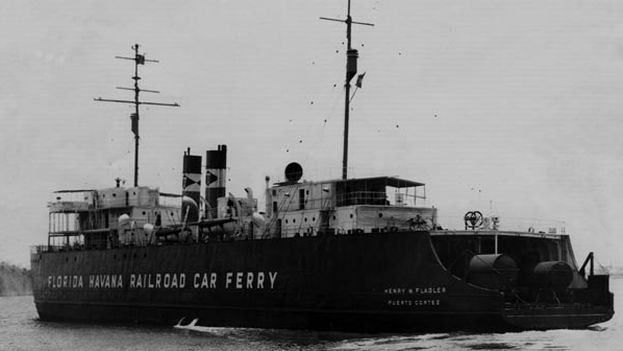
![]() 14ymedio, Orlando Palma, Havana, 21 February 2015 — Jose Manuel is 70 years old and has spent more than half his life fishing from Havana’s Malecon. For this retiree with leathery skin and eyes that have seen almost everything, it is a dream to catch sight again of that ferry that used to go to Florida and that he so liked when he was a child. “We kids used to pretend to say goodbye, and although I could never travel on it, my grandmother did every now and then.” Now, while the evening falls, the septuagenarian hopes that some fish will take the bait, and before him a sea without boats extends to infinity.
14ymedio, Orlando Palma, Havana, 21 February 2015 — Jose Manuel is 70 years old and has spent more than half his life fishing from Havana’s Malecon. For this retiree with leathery skin and eyes that have seen almost everything, it is a dream to catch sight again of that ferry that used to go to Florida and that he so liked when he was a child. “We kids used to pretend to say goodbye, and although I could never travel on it, my grandmother did every now and then.” Now, while the evening falls, the septuagenarian hopes that some fish will take the bait, and before him a sea without boats extends to infinity.
Maritime transport between Havana and Cayo Hueso came to be very common in the first half of the 20th century until it was suspended in August of 1961 as a consequence of the restrictions from the American embargo of the Island. Now, the ghost of a ferry continue reading
This week, the entrepreneur Brian Hall, who leads the company KonaCat with headquarters in Fort Lauderdale, made public his interest in operating ferry trips to Cuba from Marathon’s yachting marina on 11th Street. Hall told the daily digital KeysInfoNet that he was confident of getting available space for his 200-passenger capacity catamaran with which he plans to travel between the Florida Keys and Cuba twice daily.
The news has barely reached the Island, but since last December 17 when Raul Castro and Barack Obama announced the process for reestablishment of relations between the two countries, the return of the ferry has become a matter of importance for many nostalgic people. In addition to the economic concessions and the political détente that this reconciliation would bring between the two governments, connecting both countries with a maritime route would have, besides its practical effects, a strong symbolism, many assert.
All great human endeavors have something to do with madness, say the elders. The ferry service that connected Florida with the Cuban capital started with the efforts of a man. Henry M. Flagler, an oil magnate who in 1886 founded the Florida Faster East Coast Railway for railway construction and exploitation of Florida’s east coast. In spite of the great obstacles imposed by the geography of the keys and the constant danger of hurricanes, Flagler’s madness led him to trace the rail lines to Cayo Hueso, where the service was inaugurated in January 1912. That work would be considered by many as the eighth wonder of the world, besides being the boldest infrastructure built exclusively with private funds.
Once the railway was in Cayo Hueso, some way was needed to overcome the distance to Cuba. So was born “the train moving over the waters” as the ferry was also called and whose Havana-Cayo Hueso service was inaugurated January 5, 1915. The first shipment consisted of a batch of refrigerated cars, and the boat received the name of Henry M. Flagler, in homage to the visionary entrepreneur who had died two years earlier.
“We kids used to pretend to say goodbye, and although I could never travel on it, my grandmother did every now and then.”
The dispatch of products between both shores grew like wildfire after that moment. In 1957 it came to more than half a million tons of merchandise in both directions, to which was added the transport of passengers and cars. The sea connection between the two shores lasted 46 years, and some remember it as if it were yesterday that the last boat had sailed.
“My grandmother frequently travelled to Florida on the ferry,” explains Jose Manuel, who has had a bad day for fishing. “We were poor, but part of my family went there to work and sometimes would return the same day,” he says wistfully. Near the fishing pole, seated on the wall of the Malecon, a teenager listens to the conversation and smiles with incredulity. He is of the generation that cannot conceive that at some point the Malecon was not a barrier that separated Cuba from the world but a point of connection with the neighbor to the north.
The line tightens, and it seems that something has bit. Jose Manuel concentrates on recovering from the water what is going to be his supper tonight, but in spite of his concentration he manages to say, “The day that I see that ferry arriving here again I will be able to die in peace.”
Translated by MLK
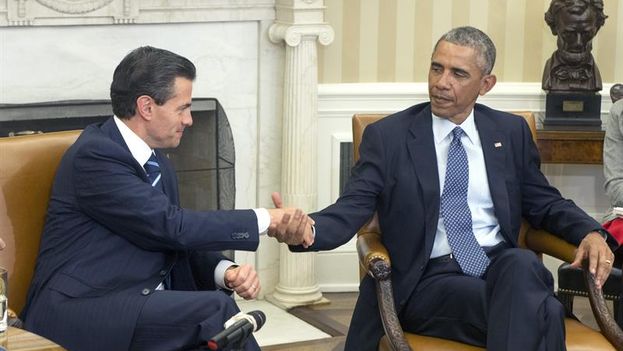
![]() 14ymedio, Miriam Celaya, Havana, 8 February 2105 — One of the most controversial issues facing both the Cuban government and Cuban independent civil society is one stemming from President Barack Obama’s December 17th speech when he stated: “Next April, we will be ready for Cuba to join the other nations in the hemisphere at the Americas Summit, but we will insist that Cuban civil society joins us so that it will not only be the leaders, but the citizens who will shape our future.”
14ymedio, Miriam Celaya, Havana, 8 February 2105 — One of the most controversial issues facing both the Cuban government and Cuban independent civil society is one stemming from President Barack Obama’s December 17th speech when he stated: “Next April, we will be ready for Cuba to join the other nations in the hemisphere at the Americas Summit, but we will insist that Cuban civil society joins us so that it will not only be the leaders, but the citizens who will shape our future.”
Immediately after, Obama added: “And I urge all my colleagues and leaders to give meaning to the commitment to democracy and human rights, which is the essence of the Inter-American Charter. Let’s leave behind the legacy of colonization and communism and the tyranny of drug cartels, dictators continue reading
After the first moments of surprise and with each other’s positions set out on the table about the decision to reestablish diplomatic relations between Cuba and the US, most Cubans are sure that the regime is not prepared to face, in a satisfactorily manner, an honest debate on democracy and human rights, and much less is willing to compromise on its stubborn refusal to recognize areas of rights which would inevitably lead to the end of its power.
But, with the same certainty and for the sake of honesty, we must recognize that we still have major obstacles to overcome in the independent civil society, starting with the one that will be, without a doubt, an essential premise: to agree on our consensus, leaving aside our differences – derived from political partisanships, ideologies, autocratic individuals and other personal agendas — that have divided us and prevented further progress over decades.
In politics, time is a fundamental asset we Cubans tend not to figure into our calculations, being accustomed as we are to half a century of stagnation.
To leave behind political adolescence and suddenly attain adulthood to achieve a common front that amplifies the democratic demands of Cubans which several generations have been struggling for under difficult conditions is not impossible, as evidenced by debate and consensus forums in the past two years. However, achieving a single agenda capable of meeting the essential requirements of all sectors of the civil society will not be easy, particularly for those who are more reluctant to dialogue and have opted instead for a confrontational stance.
It may seem premature to put on the table an issue that depends, in the first place, on the combination and coordination of many as yet unknown issues. But in politics, time is a fundamental asset we Cubans tend not to figure into our calculations, being accustomed as we are to half a century of stagnation.
Obviously, President Obama’s willingness to support civil society does not imply — or at least it should not imply — the government’s direct intervention in financing or selecting the actors who participate in the hemispheric conclave. Presumably, taking as a sign his own statements when he recognized that Cuban issues belong first of all to Cubans, his government’s commitment should be to support the proposals we make, and should include those who do not live in Cuba but who are part of the nation’s heartbeat.
In that case, it would be advisable to start a process of discussion and consultation now with participants in the independent civil society groups and leaders of opinion, journalists, activists of all existing projects, and those individuals or organizations — whether from the opposition or any civic venue — who may have ideas to contribute to the agenda.
It is time to show that we are partners in the dialogues that are sketching all our destinies.
We should not be seeking unanimity, but trying to consolidate unity in those essential points we agree on, and readying our proposals, both in a plausible memo to present at the Americas Summit and in a representation that could encompass, more inclusively and justly, the whole range of organizations and trends of the independent civil society. At the same time, we must give up our presumptions and embrace modesty for the common good.
Unfortunately, we have witnessed the persistence of intolerant positions in recent events, verbal violence and contempt for those ideas different to our own, something that is inherent to a society that has been, for a long time, tense and controlled by a regime that has sown totalitarianism and intimidation as valid methods to prevail, which a handful of democrats seem to want to perpetuate.
These actions, which have been carried out against the public image of a dissidence characterized mainly by its posture of peaceful struggle and respect for differing views, should be banished from the discussions if we wish to strengthen and achieve standing and recognition inside and outside Cuba. It is time to show that we are partners in the dialogues that are sketching all our destinies.
In short, what is truly important is, after all, to be prepared for the occasion that is politically being offered to us. It is a matter of commitment, not a easy ride, and whoever will end up representing us in this or any other international forum should feel the great historical responsibility they assume, and be worthy of the trust of all those who have committed their forces and pinned their hopes on the future of democracy in Cuba.
Translated by Norma Whiting
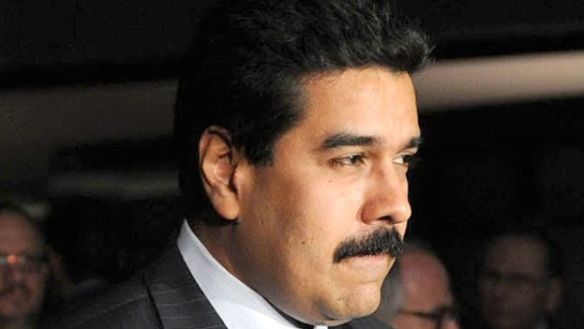
Generation Y, Yoani Sanchez, 20 February 2015 — I never thought I’d get to say this, but Venezuela is worse than Cuba. It is true that the South American country has not surpassed in number nor in intensity the shortages of basic products, the economic collapse, nor the police surveillance that we suffer; but Venezuela is worse than Cuba. Its seriousness reflects its repeating of the failed past that we Cubans are trying to escape.
In the case of both nations, the fiasco has been determined largely by improper and harmful leadership. Cuba, with a Fidel Castro who tried to mold the country in his image and likeness, taking on his marked tendency to authoritarianism, intolerance continue reading
So when I heard about the arrest of the opposition mayor Antonio Ledezma, accused of a supposed link with violent acts against the government, I couldn’t help but remember all the times that the fears of our “Maximum Leader” ended the professional, political and even the physical life of some Cuban. How many times did they justify a turn of the political screw under the pretext of an attempt against the Commander and Chief? Which of these assassinations were invented by the official propaganda itself, just to divert attention from other issues?
The scheme of “here comes the wolf” is already so hackneyed that it would be laughable if it weren’t for the dire implications for the people. Maduro theatrically – and before the cameras – plays the role of victim about to succumb to an international conspiracy. The seams of the farce are clear to see, but he is still dangerous. He believes he embodies the nation, so he denounces the plots and machinations to kill him, trying to obtain the benefits of a nationalism and trashy as it is fleeting.
His presidency has been a sequence of supposed coups, conspiracies that develop outside the borders, and enemies who are trying to destabilize the country
Chavez’s successor does not know how to deal with the normal, nor how to lead in a balanced way, nor how to offer Venezuelans a national project where everyone is included. Such that he can only fall back on fear. His presidency has been a sequence of supposed coups, conspiracies that develop outside the borders, and enemies who are trying to destabilize the country. He doesn’t know any method of leadership other than perennial tension.
Ledezma is the latest victim of this political paranoia. Leopoldo Lopez just completed a year in prison and in the coming months is very likely to be joined by other opponents added to the list of the arrested and prosecuted. Nicolas Maduro with again denounce plots against him, pointing out those presumed guilty of some attempt and directing the accusing finger at the White House.
All this to hide that he doesn’t know how to govern and can only imitate the dismal model he’s inherited from his mentors of the Plaza of the Revolution. The result is a bad copy of the Cuban model, a crude replica in which ideology has ceded its entire terrain to the ravings of a man.
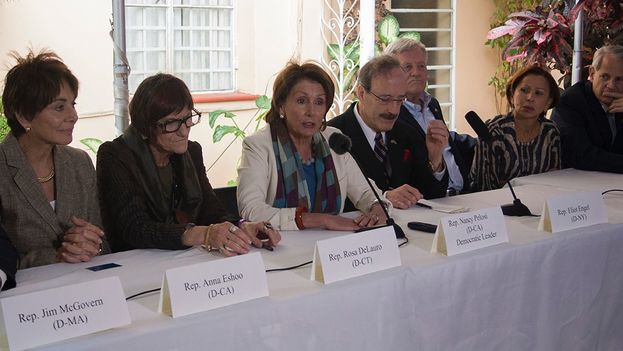
![]() 14ymedio, Luz Escobar, Havana, 19 February 2015 — On Thursday afternoon, the Democratic leader Nancy Pelosi led a press conference in which she provided a summary of her visit to Cuba, in addition to answering questions from foreign journalists and independent press. The meeting was held on the outside of the residence of Lynn Roche, Head of the Public Affairs Section of the US Interests Section in Havana (ISIS).
14ymedio, Luz Escobar, Havana, 19 February 2015 — On Thursday afternoon, the Democratic leader Nancy Pelosi led a press conference in which she provided a summary of her visit to Cuba, in addition to answering questions from foreign journalists and independent press. The meeting was held on the outside of the residence of Lynn Roche, Head of the Public Affairs Section of the US Interests Section in Havana (ISIS).
During the conference, Pelosi was accompanied by Congressmen Eliot Engel (NY), Jim McGovern (Massachusetts), Rosa DeLauro (Connecticut), Collin Peterson (Minnesota), Nydia Velázquez (New York), Anna Eshoo (California), Steve Israel (New York) and David Cicilline (Rhode Island). Prior to the meeting with journalists, the delegation had met with Cardinal Jaime Ortega y Alamino the highest authority of the Catholic Church in Cuba, as well as holding “a meeting with members of civil society continue reading
During the press conference, Congressman Eliot Engel emphasized that “now the ball is in the Cuban government’s corner… We want to see a flourishing civil society,” he said. Engel also highlighted his hope of “seeing part of free civil society at the Summit of the Americas,” although he acknowledged being “very concerned about the issue of human rights” on the island.
Nancy Pelosi, meanwhile, said she was “excited” and “proud” of the work that his delegation undertook in Cuba. The Democrat had arrived with the rest of Congressional Democrats Tuesday and on Thursday also met with the Vice President of the National Assembly, Ana Maria Mari Machado, along with twenty members of the controversial Cuban parliament. Pelosi also expressed her pride in President Barack Obama for “the audacity to make such a shift in policy towards Cuba.”
According to what the members of congress explained to the press, both sides in the negotiations for the reestablishment of relations between Cuba and the United States recognize that “this is a time to look more toward the future than the past.” For his part, Steve Israel said that “for this process to succeed both countries have to focus more on the future and less on the past. December 17th was an historic moment for the two countries, but the real story is making the changes.”
Jim McGovern said that “if the embassies open” it could improve the negotiation process because both governments are speaking directly. “We have a more mature relationship. We can not agree on everything, but I think possibly we can achieve much more if we base our relationship on mutual respect… We will continue talking about human rights,” he said, but stressed that it must first a policy “that has proved to be a failure” should be changed. Finally, he supported “establishing formal diplomatic relations, rather than trading accusations and pointing fingers at each other.”
Later Israel himself speculated on how this ongoing process will be looked back on, and “how those who embraced the future of those who embraced the past will differ.”
At the end of the press conference, the delegation of Democratic members of congress met with First Vice President Miguel Diaz-Canel. To a question from 14ymedio regarding whether they had noticed any desire on the part of the Cuban government to cooperate on the issue of computerizing Cuban society and access to new technologies, Anna Eshoo stressed that “younger people in Cuba, in particular, are hungry for this, and recognize the empowerment that access to broadband would bring.”
Congresswoman Eshoo said that she “had the pleasure of sitting at lunch” with the blogger Harold Cardenas from La Joven Cuba blog, and had “a wonderful discussion.” As for the “preservation of values” that has so concerned the Cuban ruling class lately, the congresswoman said she let them know she understood their position.
Nydia Velázquez conveyed to the those present that they “would like to share [their] experience in promoting economic development,” especially in the field of small private businesses, which in the case of the US are “the backbone of the economy.” This would help the economic growth of many Cuban families, said the congresswoman.
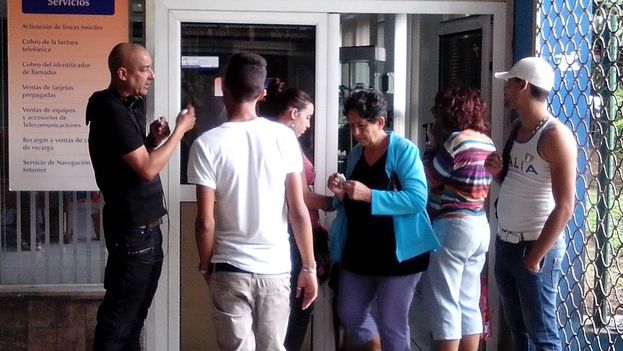
![]() 14ymedio, Rosa Lopez, 18 February 2015 — These days the line outside the State-run Nauta Internet “cafés” all over the country are much longer than usual. The reduction, to half price for Internet connection cards is the reason for such an influx. The special offering, put into effect by the State-run Cuba Telecommunications Company (ETECSA) this last 10 February, will remain in effect until this coming 10 April. Users not have to pay 2.50 CUC (convertible pesos) for one hour of Internet access, instead of the usual 5.00 CUC.
14ymedio, Rosa Lopez, 18 February 2015 — These days the line outside the State-run Nauta Internet “cafés” all over the country are much longer than usual. The reduction, to half price for Internet connection cards is the reason for such an influx. The special offering, put into effect by the State-run Cuba Telecommunications Company (ETECSA) this last 10 February, will remain in effect until this coming 10 April. Users not have to pay 2.50 CUC (convertible pesos) for one hour of Internet access, instead of the usual 5.00 CUC.
The measure has caused some excitement among customers, hoping that the special offering will be maintained to the end of the year. “It’s still expensive, but if now I have to pay half the price it means I can do twice the work continue reading
In front of the Nauta Internet room in the centrally located Focsa Building, people spread the word of the new prices. “I have to come a lot. I’m a sailor and I’m looking for a contract to work on a cruise, so I shouldn’t have to pay so much,” explained José Antonio Romero who, nevertheless, believes that “it’s still armed robbery, to pay so much for Internet.”
The Nauta Internet rooms opened in June 2013 and there are now over 155 nationwide. In statements to the official press, ETECSA’s Director of Institutional Communication, Luis Maneul Díaz Narajo, said that during the first quarter of 2015, another 136 rooms with 538 computer stations will be added in the Youth Computing Clubs.
Local navigation Nauta opened in June 2013 and there are now over 155 nationwide. Speaking to the official press, the director of Institutional Communication ETECSA, Luis Manuel Díaz Naranjo, said that during the first quarter of 2015 136 other rooms with 538 points will be added in the Joven Clubs de Computación (Youth Clubs for Computing).
Despite the high prices of the connection rooms, the demand is very high. According to the National Bureau of Statistics, in 2012 Cuba had only a 25 percent Internet penetration with a population of 11.2 million inhabitants.